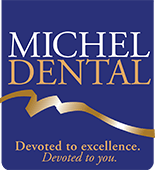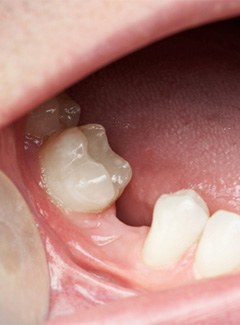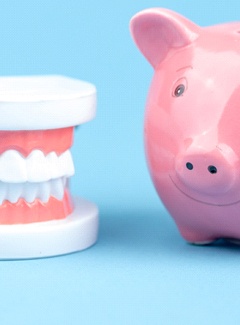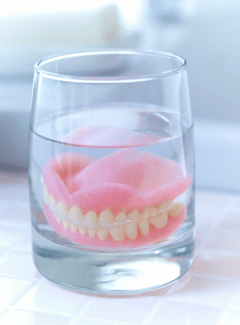
Dentures – Topeka & Silver Lake, KS
A Reliable, Affordable Way to Replace Teeth
If you have multiple gaps in a single arch of teeth or have lost the entire row of teeth, the Michel Dental team is here to help. Our dental prosthetics are all custom-made using high quality, long-lasting materials. Your new teeth will fit comfortably in your mouth, and they’ll keep you smiling throughout the day while you enjoy your favorite meals and enjoy talking with your friends and loved ones. If you want to learn more about partial and full denture, call our office today to set up a consultation with Dr. Michel or one of other knowledgeable dental experts.
Why Choose Michel Dental for Dentures & Partial Dentures?
- Total Customization – No “One Size Fits All” Solution
- Decades of Proven Reconstructive Expertise
- Implant-Retained Dentures Available
Who’s a Good Candidate for Dentures?

If you lack teeth, you’ll likely be a good dentures candidate in Topeka and Silver Lake. After all, the restorations can fill any number of smile gaps. Still, the only way to know for sure is to consult with our dentists. Based on an oral exam, the two will assess whether you’re eligible for treatment. They can also prep you with gum and bone work or suggest other replacement methods if you’re not. To learn more about this assessment, keep reading or call our office for more information.
Effects of Missing Teeth

Most patients want dentures due to the causes and effects of missing teeth. Left unchecked, these factors can ruin your smile and your health.
First, remember that tooth loss often stems from oral problems. Such issues can range from tooth decay and gum disease to serious dental injury. Consequently, leaving a smile gap alone will only worsen the original ailment. Unless you want that to happen, dental treatment is necessary.
Of course, losing teeth creates yet more difficulties. Talking, eating, and smiling challenges are the most obvious among them. Even worse, though, is the effect of tooth loss on your jaw. If you’re not careful, it’ll erode your jawbone, leading to facial collapse that ages your face.
What Qualifies You for Dentures?

As stated before, you might qualify for dentures should you have major tooth loss. That said, there are other symptoms to consider. The restorations are also great for sensitive teeth, tooth decay, and sufficiently healthy gum and jaw tissue. Furthermore, patients committed to dental health and appliance care will most benefit from treatment.
The denture type best for you will depend on how many teeth you’ve lost. Large numbers might result in a full denture. In contrast, missing only a few teeth could lead to a partial one. Whichever kind you get, though, it’ll be more affordable than other tooth-replacement methods. For that reason, dentures are a good option for anyone on a budget.
Alternative Tooth-Replacement Options

Should you not qualify for dentures, that’s okay. We at Michel Dental offer several other tooth-replacement options. In particular, we have:
- Dental Bridges: A dental bridge is a fixed restoration that replaces one or a few teeth. It comprises two (or more) crowns affixed to either side of an artificial tooth (i.e., pontic). As a result, this prosthetic requires healthy teeth to surround the treated smile gap.
- Dental Implants: Dental implants are restorations placed directly in your jawbone. Given that fact, they need a solid bone structure to fuse with your jaw. These prosthetics are permanent and don’t slip or fall, though they are more expensive than traditional dentures.
Learn More About Dental Bridges Learn More About Dental Implants
Types of Dentures

Getting dentures can mean one of three things. It might mean getting a partial denture to replace multiple teeth, getting full dentures to replace an entire arch, or getting implant dentures so that you can enjoy the benefits of new teeth with artificial roots. We can discuss each of these options in detail with you so that you can figure out which one offers the best way to restore your smile. Each type of denture can be customized for a more natural appearance as well as a comfortable fit.
Partial Dentures
You may be eligible for a partial denture if there are multiple gaps in your smile but still plenty of healthy teeth. A partial denture seamlessly fits into these empty spaces and is attached to the remaining natural teeth with a clasp. Most people won’t be able to tell which teeth are real and which are part of the prosthetic.
Full Dentures
Sometimes there aren’t enough teeth worth saving in an arch, at which point we may recommend extracting them and replacing the entire row with full dentures. The base of the denture will fit snugly on your gums and rely on natural suction to keep it in place whenever you talk or chew. You can also use a denture adhesive to give it more stability.
Implant Dentures
Traditional dentures continue to be used to this day for a reason, but combining them with dental implants is often the ideal choice. Implant posts surgically inserted into the jawbone give new teeth better stability and more chewing strength than they could provide on their own. In many ways, getting implant dentures is the next best thing to regaining your original teeth.
How Dentures Are Made

Ready to restore your smile with dentures in Topeka? Now that you’ve committed to the process, you probably want to know what to expect. Learning how they’re made and what materials are used to create your prosthetics will only help you appreciate your new smile that much more. Below, you can gain valuable insight as to how we achieve the final stunning results.
What Are Dentures Made Of?

Dentures are made of two parts, which are:
- Denture Base: This is the foundational structure that supports your replacement teeth. It can be made from several different materials, including acrylic, nylon, and resin. Full dentures are typically made with acrylic because the material can easily be custom shaded to resemble your natural gum tissue. Meanwhile, partials use metal clips with an acrylic base.
- Artificial Teeth: Often made from resins or porcelain, the artificial teeth are attached to the denture base. Porcelain is a far more popular option because not only does it look just like your natural teeth, but it’s a very durable material.
The Denture Creation Process

Since each denture is custom-made to fit your mouth perfectly, it requires a multi-step process. First, our team will take impressions of your upper and lower gums using a thick paste. These will be used to create a plaster model that is the exact size and shape of your mouth, ensuring the final denture is an exact fit.
The plaster model will be sent to a trusted dental laboratory for the creation of your final dentures. A technician will start by creating a wax replica of your gumline and set artificial teeth in place using a mechanical device known as an articulator. Minor adjustments are made before they’re sent back to the office for a fitting.
If we agree your dentures look good, they will be sent back to the dental lab to finish the process. This involves boiling the dentures and placing them in a flask, adding plaster to hold their shape. A technician will then place the flask in hot water to melt away the wax portions. Holes are made in the teeth and acrylic is injected into the flask to replace the wax.
Using special tools, the plaster is carefully removed. The dentures are then placed in an ultrasonic bath to remove any remaining plaster. Excess acrylic will be cut from the denture and the restoration is polished to perfection.
Once the dentures are ready, you will return to the office for a fitting. If needed, adjustments are made to ensure everything is working properly and accordingly.
Adjusting to Your New Dentures

When you first get your dentures, it’s completely normal to feel mild discomfort. Don’t worry – this feeling is temporary and should gradually fade with time! Once your mouth adjusts to your prosthetics, they’ll feel very similar to natural teeth. It’s strongly recommended that you stick to a soft-food diet during this adjustment period.
Benefits of Dentures

When you’re missing teeth, it can be difficult to complete tasks that you once found easy, like chewing thoroughly and speaking clearly. Dentures are a life-changing tooth replacement option for people missing several, most of, or all of their teeth due to their ability to improve quality of life. If you have suffered from tooth loss, dentures can give your smile another chance by providing these amazing benefits.
Psychological Benefits

People who don’t have any teeth often have difficulty accepting their tooth loss. Along with this comes a negative impact on self-esteem as well as a higher risk of experiencing sadness and depression. By restoring the appearance and function of one’s smile with dentures, patients are likely to experience increased confidence and self-esteem. Dentures are able to reduce anxieties about appearance, speech, chewing, and more!
Clearer Enunciation

Missing teeth can make it more difficult to speak clearly. When you pronounce words, your lips and tongue need to be positioned properly. Without touching your tongue to your teeth, some words are difficult to say clearly. Because dentures act as your missing teeth, they allow to you enunciate more clearly while you speak. After a little bit of practice, you will be speaking just like you used to.
Improves Nutrition

Many nutritious foods are tough in texture. This includes certain vegetables, fruit, and healthy proteins. When you are unable to chew your food thoroughly, you can experience indigestion and malnutrition. With an improved ability to chew, dentures allow for a more expansive diet full of nutritious foods. Ultimately, dentures can help your body receive the essential vitamins and minerals you need for optimal overall health.
Preserves Oral Health

If you still have some remaining natural teeth, getting dentures can help to keep them from shifting to other areas of the mouth. Dentures are also able to bear some of the weight of regular chewing, therefore reducing the wear and tear of your existing teeth.
Expands Opportunity

Your smile is one of the very first things that people notice about you. When it comes to your professional life, including interviews, sales, and promotions, it is crucial that you make an excellent first impression. Having a complete smile is certainly an advantage in these cases.
Understanding the Cost of Dentures

As a classic method of replacing missing teeth, dentures have provided countless patients with a renewed ability to eat, speak, and smile with confidence again after tooth loss. At Michel Dental, we don’t want money to be a barrier between you and a potentially life-changing treatment. Our team will happily walk you through the cost of dentures in Topeka & Silver Lake and give you the help you need to navigate the price of your new smile.
Factors That Affect the Cost of Dentures

Not all dentures are created equally. Each prosthetic is individually designed to meet your unique needs. That said, there are three main factors that impact the cost of dentures:
- Preparation – Some patients require preliminary treatments before dentures can be placed. For instance, extremely decayed or damaged teeth may need to be removed, and gum disease should be treated to give your new teeth a healthy foundation.
- Base acrylic – The base of your denture (the part that is dyed to match the color of your gums) can be made from various types of acrylic, each of which come with a different price.
- Replacement teeth – You can also select which material your replacement teeth will be made from. Your preferences may vary, but most patients choose porcelain or acrylic due to their durability and lifelike appearances.
When you visit us for a consultation, your denture dentist in Topeka & Silver Lake will go over these factors with you and provide you with a cost estimate you can trust.
Are Implant Dentures More Expensive?

While implant dentures have a higher initial price than traditional ones, they could potentially last up to four times longer. Because dental implants are made from biocompatible titanium, they fuse to the jawbone. Not only does this create a more reliable foundation for your new teeth, but it also stimulates the bone and oral tissues to keep your face looking young. In short, implant dentures are a great investment that could prove to be more cost-effective in the long run.
Does Dental Insurance Cover Dentures?

More often than not, yes! The majority of dental insurance providers cover a portion of the cost of dentures. At Michel Dental, we generally accept all dental insurance plans and are even in-network with Blue Cross Blue Shield, Delta Dental, United Concordia, Cigna, and Guardian DentalGuard Network. We can even handle all of the paperwork for you, making the process of reconstructing your smile so much easier!
Other Options for Making Dentures Affordable

If you’re uninsured, we have other options of making dentures in Topeka & Silver Lake affordable. One such option is CareCredit, a financing company that offers multiple payment plans to choose from. Most of these plans come with very low or even zero interest for eligible patients.
If you’re looking to save on more than just dentures, we have our very own in-house alternative to insurance – our Smile Savings Plan. For one low yearly fee, you get FREE preventive care and a 15% discount on most other services, including dentures.
Denture Maintenance & Aftercare

After restoring your smile with customized dentures in Topeka, you’ll be able to enjoy countless benefits that can change your life. In order to get the most out of your investment, it’s important to properly care for not just your prosthetic, but also your existing teeth and gums, which are the foundation for your new dentures. Below, we’ve included some helpful aftercare advice to keep your restoration clean and fully functional.
Removable Dentures

Removable traditional dentures aren’t anchored within your mouth permanently, meaning you’ll need to maintain them differently than you would implant dentures . Below, our team has comprised a list of aftercare guidelines for removable dentures.
Remove After Eating
After you eat a meal, you’ll want to remove and rinse your dentures, being sure to clean away any leftover food debris that may be attached to your prosthetic. If you don’t do this often enough, you may notice that your dentures begin to smell due to bacteria accumulation.
Clean Every Day
It’s recommended that you clean your dentures at least once a day. This includes using a denture-safe brush and cleanser to thoroughly remove any plaque buildup that has occurred over the course of the day. This will help minimize staining and keep your restorations looking like new.
Safely Store Them
It’s not uncommon for dentures to get broken or damaged when they’re not in the mouth. That’s why we recommend safely storing them whenever you’re not wearing them. For full dentures, store them in a glass of room temperature water in a safe location. For partials, we’ll provide you with a hard storage container to keep them safe and clean.
Remove While Sleeping
You should never sleep with your dentures in your mouth. Removing them and storing them in a glass of room temperature water or denture soaking solution will help them maintain their shape as well as provide your gums with much-needed rest.
Notice Changes in Fit & Comfort
Dentures last an average of seven years before needing to be replaced. This is because your bone and facial structure will gradually change, altering the way your prosthetic fits and functions. With routine checkups and cleanings, your dentist in Topeka can make sure that your dentures continue serving you the best they can!
Denture FAQs

Dentures are one of the most popular solutions for tooth replacement. However, if you’re considering this option, you may be curious about various aspects of dentures. Dr. Michel wants his patients to have all the information they need to feel confident in their treatment. That’s why he’s included the answers to some of the most frequently asked questions about dentures. Read on to learn some of the most significant denture FAQ’s in Topeka & Silver Lake.
How Long Will My Dentures Last?
With proper care, dentures can last at least 5 to 7 years. However, to get the most out of your dentures, it’s vital to maintain them by cleaning your prosthesis and your mouth daily. You will also visit our office for routine checkups, where we can make any adjustments to your dentures if needed. Typically, you will need what is called a reline, which allows us to adjust your denture to be more comfortable in your mouth as time goes on.
What’s Life with Dentures Like?
When you first get your dentures, there is a slight adjustment period. It may feel different to chew, speak, and smile, but these routine activities will quickly get easier. Saying certain words may be especially difficult at first, but you can certainly improve your speech by practicing in the mirror. After this short time getting used to your dentures, you’ll be able to speak, eat, and grin with the ultimate confidence of having a full smile.
What Type of Denture is Best for Me?
Because no two smiles are the same, the only way to know with certainty what type of denture is best for you is to visit our office for a consultation. Dr. Michel will carefully examine your mouth, the condition of your oral health, and your pattern of tooth loss. From there, he will develop a personalized treatment plan with a recommendation that will provide amazing results. Typically, patients who are missing teeth more randomly throughout their mouth are candidates for partial dentures. If you’re missing all or most of your teeth, full dentures are probably the perfect solution. And, if you want the most stable smile available, implant-retained dentures could be the right option!
How Much Will My Dentures Cost?
There are various types of dentures, which is why the cost of your treatment will vary. After examining your mouth, Dr. Michel will need to treat any preexisting problems like gum disease, which may impact the overall cost of your treatment. Keep in mind that usually the more teeth you need replacing, the higher the cost of your dentures will be. Additionally, implant-retained dentures will typically have a higher price tag than traditional dentures.
Will It Hurt to Get Dentures?
Generally, denture treatment itself doesn’t hurt. Dentists work to ensure it goes smoothly and comfortably. That said, there are some things you should know.
Firstly, you may need a tooth extraction beforehand. (This procedure would make room for your denture(s).) In that case, you’ll likely feel some discomfort after the surgery. You can compensate by taking prescribed painkillers as directed. From there, your aches should fade after 3-5 days.
Next, wearing a new denture can involve some mild pain. You may feel some irritation as your mouth adjusts to the appliance. As for how long it’ll last, the timing varies from person to person. Should the pain intensify, though, call us at once. Your denture may not fit well, or you could have an underlying health issue.
Is It Hard to Talk with Dentures?
Initially, it’s hard to talk with dentures. Learning to do so takes time and effort. Plus, the precise timeline varies by patient.
While adjusting to dentures, you might face some speech impediments. These include lisps, slurred words, and so on. However, such issues are temporary and will cease over time.
Of course, there are ways to make the adjustment easier. You could practice pronunciation by speaking slowly. On the other hand, you might use denture adhesive to give your new teeth more stability.
Will Dentures Change the Shape of My Face?
Ultimately, dentures will alter your face’s shape. Even so, there’s no need to worry – this change will enhance your looks!
You see, facial muscles sag when you lose teeth. They need a full set of pearly whites for support. As such, going without causes your face to take a sunken appearance.
Luckily, dentures can support those sagging muscles. They’d thus help your face look full, firm, and youthful. Still, you’ll need to make sure they fit correctly. Ill-fitting dentures won’t properly bolster your cheeks and jaw.
Do Upper Dentures Always Cover the Palate?
In reality, upper dentures don’t always cover the palate. Some designed for the upper arch are made to be “palate-less.”
If you didn’t know, covering the soft palate weakens your ability to taste food. Therefore, a lab can make dentures without a “plate” that shields it. That way, you can enjoy your new teeth without sacrificing your sense of taste.
These “palate-less” dentures can take various shapes. For example, many adopt the standard horseshoe structure used for lower kinds. Meanwhile, some can attach to dental implants for stability.
If you have any other questions, please don’t hesitate to contact our office!
I Need a Checkup & Cleaning I Have a Cavity or Broken Tooth I am Missing One or More Teeth I Have a Dental Emergency I want to Improve My Smile I am Worried About Gum Disease I am Anxious or Scared of the Dentist I Want a Straighter Smile I am Concerned About Sleep Apnea I Have Pain When I Open/Close My Mouth View Our Services